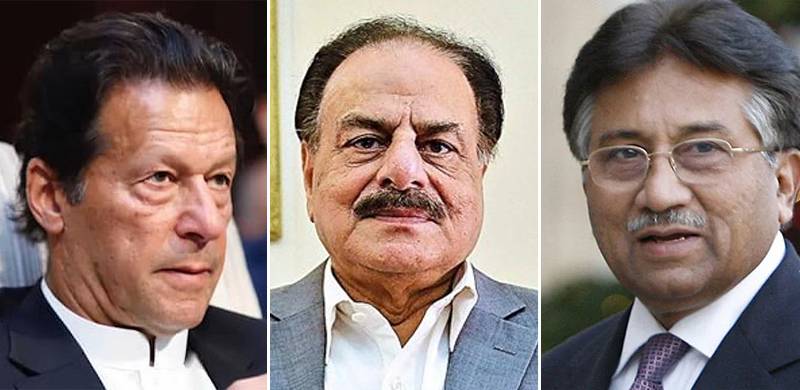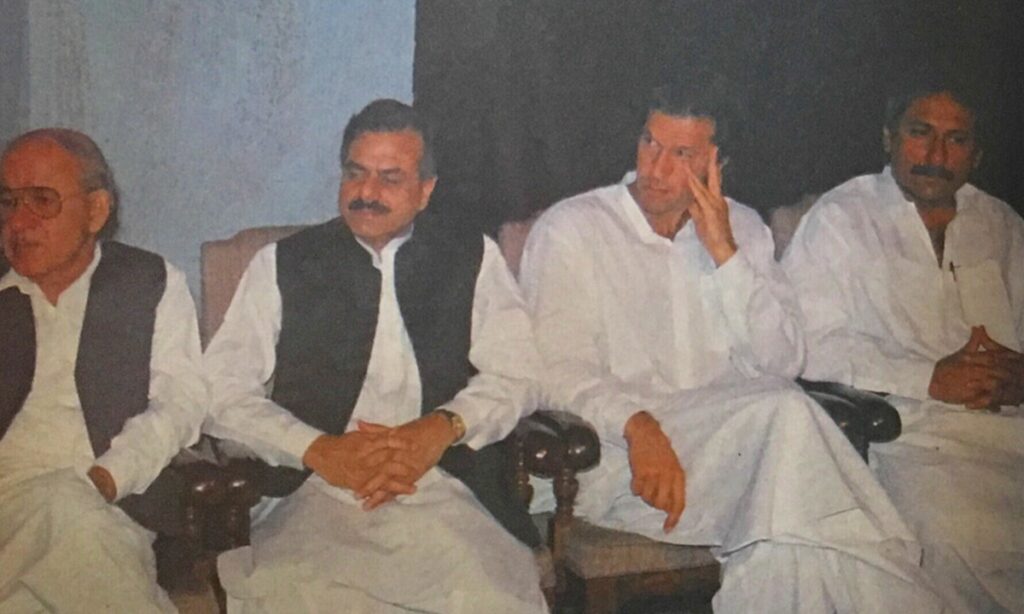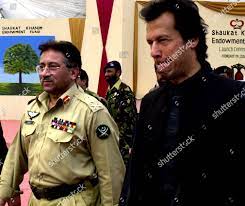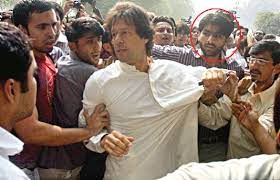
Imran Khan may try to give a 'surprise' in desperation but he is done. The domestic political situation and the international scenario do not suggest that he would return to power. He is almost 70, full of himself and he alone is responsible for his ignominious end. A lot of people don't know but he was created and then undone by the establishment.
Herald magazine in its Feb 1995 issue reported: "key players within the all powerful establishment, inside sources argue, foresee the group as being a second, rather than third force, with Imran Khan viewed as an eventual anti-PPP alternative to Nawaz Sharif, should Sharif and his group of Muslim Leaguers fail to deliver." This was published in 1995.
Former ISI chief Hamid Gul was one of his early backers. They later fell out. But project Imran ran into problems when Musharraf took over in 1999. Musharraf wanted to rule for a long time and didn't need Imran but he supported then army chief, Pervez Musharraf, even through a heavily rigged referendum. Imran also supported the war on terror. But when Musharraf declined to give Imran 100 seats in the parliament, he turned against Musharraf after having supported his rigged referendum and the war on terror.


For who were either too young then or don't believe me, here is the video where Imran Khan is speaking in favour of the war on terror and supporting Musharraf:
https://twitter.com/mughalbha/status/1153713940892913666
Herald published an article in this regard in February 1995. Moving on to 2002, Imran, rebuffed by Musharraf, found himself in political wilderness as Benazir's PPP won the largest number of votes (though not the seats) and Musharraf focused his efforts to secure the support of a group of PPP's MNAs through coercion and blackmail. Imran won only one seat. Musharraf's principal secretary Tariq Aziz told Imran that next time he won't even win one seat, according to a report in the U.K. daily guardian.
From 2002 to 2007, Imran Khan survived only on TV screens thanks to some friendly anchors. Nawaz Sharif was in exile and Benazir had clearly established herself as the most popular leader although she was outside the country. Imran was nowhere.
In Nov 2007, when he went to the Punjab University campus to speak in favour of the lawyer's movement, he was manhandled by Jamaat Islami supporters.

Imran's political fortunes took a positive turn when Zardari's relations became very strained with the army in the aftermath of the U.S. attack on Osama bin Laden's hideout in May 2011. Pervez Kayani and Gen Pasha diverted the attention from their own abject failure by inventing a story called "memogate".
The truth was that the Pakistani forces had failed to detect/intercept the American helicopters that invaded Abbottabad. They needed a scapegoat and that was the PPP government. It was the most bizarre story where an alleged "CIA agent" Husain Haqqani had to go through a Pakistani-American businessman of questionable reputation, Mansur Ejaz, to approach a top U.S. military official.
Although Gen Pasha later apologized to Zardari, the story didn't die. Imran helped Gen Pasha by "revealing" at a Lahore Public meeting in Oct 2011, the "memogate" conspiracy. At the same time, Imran cultivated relations with Americans and met then US Envoy to Pakistan Cameron Munter in November 2011. The Sunday Times reported (though later denied) that Gen Pasha was present in the meeting.
Project Imran Khan, originally sponsored by Gen Hamid Gul, took a new life in 2011. Imran's closest friend, Naeem Ul Haq, invited me to join the PTI in July 2012 and confided that Gen Pasha had a long meeting with Imran in Bani Gala in April 2012 and assured him of full support.
Nawaz Sharif won 125 seats, PPP 31, and Imran's PTI 27 in 2013 elections. Although PTI secured only 50% of the popular vote compared to the PMLN, Imran insisted the election has been stolen. He launched a campaign against the alleged rigging by claiming that the caretaker CM Punjab Najam Sethi had called Nawaz Sharif and assured him that the “35 punctures” had been fixed.
The phone conversation, said Naeemul Haq, Chief of Staff to the PTI chairman, who tweeted about it in early 2014, came from an ambassador of a key western power.
The rigging allegations were patently false. Years later, the 35 punctures story was proved to be a fabrication. A TV anchor who helped spread this conspiracy theory, Shahid Masood, later apologised to Najam Sethi in 2021. But in 2014, Imran ran away with this complete lie and mobilised his supporters to stage a sit-in in Islamabad with the help of a long time establishment proxy, Tahir ul Qadri who comes and disappears from the national political scene from his permanent home in Canada.
The dharna was allegedly supported by the then ISI chief Zaheer ul Islam. It was even later alleged by Nawaz that Zaheer tried to force him to resign. Zaheer denied that. It was believed that Imran also met the then army chief Raheel Sharif around that time.
According to one insider, when Imran met Raheel Sharif, he raised his index finger and said something to that effect, "Look Sharif, people are with me and they want a change." General Sharif was apparently put off and told Zaheer ul Islam to end the dharna fiasco during which Imran's supporters attacked the parliament.
Although Nawaz Sharif survived this attempt to oust him, many in the establishment were just bidding on time to strike again. Differences over key issues as to who should control the CPEC contributed to mistrust and bad blood between Nawaz and then army's top brass.
One ex-ambassador (who is a regular on TV shows) told me Raheel asked Nawaz to promote him to field marshal's position; a request Nawaz refused. Revelations about foreign companies in the so-called "Panamagate" provided a god-sent opportunity to Nawaz Sharif's enemies after the Panama papers were released in April 2016.
The agencies and judges reportedly collaborated to convict Nawaz Sharif on flimsy charges of having employment in the UAE. He was formally disqualified in April 2017. Ironically, no corruption charges have been proven against Nawaz Sharif in a court of law during the last five years including more than 3-1/2 years under Imran as PM.
With Nawaz disqualified and PMLN under pressure, the ground for Imran Khan was clear. Even CJ Saqib Nisar dropped any pretence of proprietary.
Saqib Nisar, then chief justice of the supreme court, visited the constituency of Sheikh Rashid in July 2018 (when the election campaign was underway). Rashid was PTI's ally and later became interior minister in Imran's cabinet. Sh. Rashid has supported every army dictator
since Zia, and has been accused of being on the payroll of the agencies since his college days in the 1970s. Jahangir Tareen played a key role in Imran's campaign. Jahangir is related to a former ISI chief, Akhtar Abdur Rehman and owns large businesses including sugar mills.
Jahangir Tareen was instrumental in enlisting the support of known turncoats who switch sides upon getting the "right signals". Thus a powerful alliance of the establishment, judges, and known pro-establishment politicians helped Imran get into power.
Even then, he could not secure the majority. PTI secured just 31% of the popular vote and 149 seats in the parliament. He formed the government with the establishment's help as parties like the MQM were forced to support Imran.
A PTI MPA, Firdous Shamim, told me that a military officer in Karachi told him that the PTI would get even more seats in Karachi than Firdous was expecting. Firdous requested him not to be too kind. Imran got into power with the full support of the establishment and media. Anyone in media who didn't fall into line faced the wrath of the agencies. His rule was alleged to be worse for the media freedom than even that of Musharraf by leading journalists and international organisations. Despite all this support from the establishmentt, what went wrong?
The first time the establishment started to feel uncomfortable when Imran and his finance minister Asad Umar showed their inexperience and incompetence in handling the economy. They turned a rising current account deficit into a full-blown sovereign debt crisis. Imran was told to fire Asad, and bring an experienced economist Hafeez Sheikh as finance minister. Hafeez had, ironically, served in the same position under Zardari's PPP goernment.
Next point of concern was the foreign policy blunder when he committed to go to Malaysia and then took a U-turn, apparently at Saudi Arabia's annoyance. That was a huge mistake as Saudis had bailed out Pakistan more than once in the past. Many senior figures started to see him as a loose canon.
One former corp commander told me, "We have to now think where this is going to lead and what should we do about Imran." Ironically, the same gentleman told me, "as much as we don't like the PPP, it is the only organised and real political party in Pakistan." I just smiled.
However, Imran thought he was indispensable and the establishment had no options. He allegedly discussed replacing Gen Bajwa, prior to his retirement day, in a conversation in Governor House, Lahore, insisting why not. Maybe, that was the straw that broke the camel's back.
Herald magazine in its Feb 1995 issue reported: "key players within the all powerful establishment, inside sources argue, foresee the group as being a second, rather than third force, with Imran Khan viewed as an eventual anti-PPP alternative to Nawaz Sharif, should Sharif and his group of Muslim Leaguers fail to deliver." This was published in 1995.
Former ISI chief Hamid Gul was one of his early backers. They later fell out. But project Imran ran into problems when Musharraf took over in 1999. Musharraf wanted to rule for a long time and didn't need Imran but he supported then army chief, Pervez Musharraf, even through a heavily rigged referendum. Imran also supported the war on terror. But when Musharraf declined to give Imran 100 seats in the parliament, he turned against Musharraf after having supported his rigged referendum and the war on terror.


For who were either too young then or don't believe me, here is the video where Imran Khan is speaking in favour of the war on terror and supporting Musharraf:
https://twitter.com/mughalbha/status/1153713940892913666
Herald published an article in this regard in February 1995. Moving on to 2002, Imran, rebuffed by Musharraf, found himself in political wilderness as Benazir's PPP won the largest number of votes (though not the seats) and Musharraf focused his efforts to secure the support of a group of PPP's MNAs through coercion and blackmail. Imran won only one seat. Musharraf's principal secretary Tariq Aziz told Imran that next time he won't even win one seat, according to a report in the U.K. daily guardian.
From 2002 to 2007, Imran Khan survived only on TV screens thanks to some friendly anchors. Nawaz Sharif was in exile and Benazir had clearly established herself as the most popular leader although she was outside the country. Imran was nowhere.
In Nov 2007, when he went to the Punjab University campus to speak in favour of the lawyer's movement, he was manhandled by Jamaat Islami supporters.

Imran's political fortunes took a positive turn when Zardari's relations became very strained with the army in the aftermath of the U.S. attack on Osama bin Laden's hideout in May 2011. Pervez Kayani and Gen Pasha diverted the attention from their own abject failure by inventing a story called "memogate".
The truth was that the Pakistani forces had failed to detect/intercept the American helicopters that invaded Abbottabad. They needed a scapegoat and that was the PPP government. It was the most bizarre story where an alleged "CIA agent" Husain Haqqani had to go through a Pakistani-American businessman of questionable reputation, Mansur Ejaz, to approach a top U.S. military official.
Although Gen Pasha later apologized to Zardari, the story didn't die. Imran helped Gen Pasha by "revealing" at a Lahore Public meeting in Oct 2011, the "memogate" conspiracy. At the same time, Imran cultivated relations with Americans and met then US Envoy to Pakistan Cameron Munter in November 2011. The Sunday Times reported (though later denied) that Gen Pasha was present in the meeting.
Project Imran Khan, originally sponsored by Gen Hamid Gul, took a new life in 2011. Imran's closest friend, Naeem Ul Haq, invited me to join the PTI in July 2012 and confided that Gen Pasha had a long meeting with Imran in Bani Gala in April 2012 and assured him of full support.
Nawaz Sharif won 125 seats, PPP 31, and Imran's PTI 27 in 2013 elections. Although PTI secured only 50% of the popular vote compared to the PMLN, Imran insisted the election has been stolen. He launched a campaign against the alleged rigging by claiming that the caretaker CM Punjab Najam Sethi had called Nawaz Sharif and assured him that the “35 punctures” had been fixed.
The phone conversation, said Naeemul Haq, Chief of Staff to the PTI chairman, who tweeted about it in early 2014, came from an ambassador of a key western power.
The rigging allegations were patently false. Years later, the 35 punctures story was proved to be a fabrication. A TV anchor who helped spread this conspiracy theory, Shahid Masood, later apologised to Najam Sethi in 2021. But in 2014, Imran ran away with this complete lie and mobilised his supporters to stage a sit-in in Islamabad with the help of a long time establishment proxy, Tahir ul Qadri who comes and disappears from the national political scene from his permanent home in Canada.
The dharna was allegedly supported by the then ISI chief Zaheer ul Islam. It was even later alleged by Nawaz that Zaheer tried to force him to resign. Zaheer denied that. It was believed that Imran also met the then army chief Raheel Sharif around that time.
According to one insider, when Imran met Raheel Sharif, he raised his index finger and said something to that effect, "Look Sharif, people are with me and they want a change." General Sharif was apparently put off and told Zaheer ul Islam to end the dharna fiasco during which Imran's supporters attacked the parliament.
Although Nawaz Sharif survived this attempt to oust him, many in the establishment were just bidding on time to strike again. Differences over key issues as to who should control the CPEC contributed to mistrust and bad blood between Nawaz and then army's top brass.
One ex-ambassador (who is a regular on TV shows) told me Raheel asked Nawaz to promote him to field marshal's position; a request Nawaz refused. Revelations about foreign companies in the so-called "Panamagate" provided a god-sent opportunity to Nawaz Sharif's enemies after the Panama papers were released in April 2016.
The agencies and judges reportedly collaborated to convict Nawaz Sharif on flimsy charges of having employment in the UAE. He was formally disqualified in April 2017. Ironically, no corruption charges have been proven against Nawaz Sharif in a court of law during the last five years including more than 3-1/2 years under Imran as PM.
With Nawaz disqualified and PMLN under pressure, the ground for Imran Khan was clear. Even CJ Saqib Nisar dropped any pretence of proprietary.
Saqib Nisar, then chief justice of the supreme court, visited the constituency of Sheikh Rashid in July 2018 (when the election campaign was underway). Rashid was PTI's ally and later became interior minister in Imran's cabinet. Sh. Rashid has supported every army dictator
since Zia, and has been accused of being on the payroll of the agencies since his college days in the 1970s. Jahangir Tareen played a key role in Imran's campaign. Jahangir is related to a former ISI chief, Akhtar Abdur Rehman and owns large businesses including sugar mills.
Jahangir Tareen was instrumental in enlisting the support of known turncoats who switch sides upon getting the "right signals". Thus a powerful alliance of the establishment, judges, and known pro-establishment politicians helped Imran get into power.
Even then, he could not secure the majority. PTI secured just 31% of the popular vote and 149 seats in the parliament. He formed the government with the establishment's help as parties like the MQM were forced to support Imran.
A PTI MPA, Firdous Shamim, told me that a military officer in Karachi told him that the PTI would get even more seats in Karachi than Firdous was expecting. Firdous requested him not to be too kind. Imran got into power with the full support of the establishment and media. Anyone in media who didn't fall into line faced the wrath of the agencies. His rule was alleged to be worse for the media freedom than even that of Musharraf by leading journalists and international organisations. Despite all this support from the establishmentt, what went wrong?
The first time the establishment started to feel uncomfortable when Imran and his finance minister Asad Umar showed their inexperience and incompetence in handling the economy. They turned a rising current account deficit into a full-blown sovereign debt crisis. Imran was told to fire Asad, and bring an experienced economist Hafeez Sheikh as finance minister. Hafeez had, ironically, served in the same position under Zardari's PPP goernment.
Next point of concern was the foreign policy blunder when he committed to go to Malaysia and then took a U-turn, apparently at Saudi Arabia's annoyance. That was a huge mistake as Saudis had bailed out Pakistan more than once in the past. Many senior figures started to see him as a loose canon.
One former corp commander told me, "We have to now think where this is going to lead and what should we do about Imran." Ironically, the same gentleman told me, "as much as we don't like the PPP, it is the only organised and real political party in Pakistan." I just smiled.
However, Imran thought he was indispensable and the establishment had no options. He allegedly discussed replacing Gen Bajwa, prior to his retirement day, in a conversation in Governor House, Lahore, insisting why not. Maybe, that was the straw that broke the camel's back.

